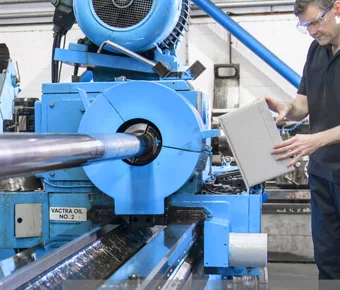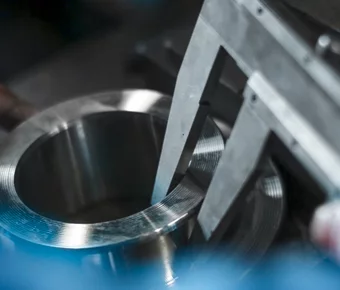1.4878 || AISI 321H
Austenitic heat-resistant chromium-nickel steel
The 1.4878 is an austenitic heat-resistant chromium-nickel steel stabilized with titanium. It is chemically similar to 1.4541. The difference lies in the carbon content.
Heat-resistant Stainless Steel
General properties in processing:
- Good machinability
- Good weldability
Distinguishing properties:
- Scale resistant up to 850 °C
Corrosion resistance:
- In oxidizing media up to 850 °C
- In oxidizing and sulfur-containing media up to 750 °C
Applications:
- Apparatus and container construction
- Automotive industry
- Chemistry and petrochemistry
- Industrial furnace construction
- Pulp and paper industry
Chemical values – Reference analysis (weight proportion in %)
| C | 0,04 – 0,10 |
| Si | max 1,0 |
| Mn | max 2,0 |
| P | max 0,045 |
| S | max 0,015 |
| Cr | 17,0 – 19,0 |
| Ni | 9,0 – 12 |
| Ti | 5xC – 0,8 |
Mechanical values at room temperature
| Hardness HB | ≤ 215 |
| Yield strength Rp 0.2 | ≥ 190 N/mm2 |
| Tensile strength Rm | 550 – 700 N/mm2 |
| Elongation A5 | ≥ 40 % |
Creep strength
Creep strength is the mechanical initial stress that causes a material to break after a certain period of stress duration and at a constant temperature above the transition temperature under constant tensile force.
| Temperature | 1 000 h | 10 000 h | 100 000 h |
|---|---|---|---|
| Temperature: 600 °C | 1 000 h : 200 N/mm2 | 10 000 h: 142 N/mm2 | 100 000 h: 65 N/mm2 |
| Temperature: 700 °C | 1 000 h : 88 N/mm2 | 10 000 h: 48 N/mm2 | 100 000 h: 22 N/mm2 |
| Temperature: 800 °C | 1 000 h : 30 N/mm2 | 10 000 h: 15 N/mm2 | 100 000 h: 10 N/mm2 |
Creep limit
Creep limit is the initial stress that leads to a specified plastic deformation under constant tensile stress at a predetermined temperature and duration of stress.
| Temperature | 1 % Creep limit for 1,000 h | 10 000 h |
|---|---|---|
| Temperature: 600 °C | 1 % Creep limit for 1,000 h: 110 N/mm2 | 10 000 h: 85 N/mm2 |
| Temperature: 700 °C | 1 % Creep limit for 1,000 h: 45 N/mm2 | 10 000 h: 30 N/mm2 |
| Temperature: 800 °C | 1 % Creep limit for 1,000 h: 15 N/mm2 | 10 000 h: 10 N/mm2 |
Coefficient of thermal expansion
Coefficient of thermal expansion for heat-resistant alloys, which have a high coefficient of thermal expansion and low thermal conductivity, leading to temperature and stress differences in a component or assembly. The coefficient of thermal expansion is expressed by the proportional length change for each degree of temperature increase, usually as 10 –6 K –1.
| Temperature | Coefficient of thermal expansion |
|---|---|
| Temperature: 200 °C | Coefficient of thermal expansion: 17,0 |
| Temperature: 400 °C | Coefficient of thermal expansion: 18,0 |
| Temperature: 600 °C | Coefficient of thermal expansion: 18,5 |
| Temperature: 800 °C | Coefficient of thermal expansion: 19 |
Standards for pipes
- EN 10216-5
- EN 10297-2
- ASME SA312
The information provided on this page is non-binding. It serves only as orientation.
We cannot guarantee the results in processing and application of the products.

Tables and rates

Delivery Program
Not the right steel available?
You will find the complete program for stainless steel piping systems in various materials for the highest requirements with us.







